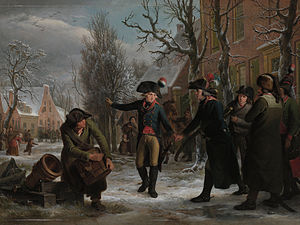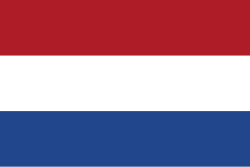| Batavian Revolution | |||
|---|---|---|---|
| Part of the Atlantic Revolutions | |||
 Patriot troops, 18 January 1795. | |||
| Date | 1781–1795 | ||
| Location | |||
| Caused by | Authoritarianism of William V | ||
| Goals |
| ||
| Resulted in | Batavian Republic established | ||
| Parties | |||
| Lead figures | |||
| History of the Netherlands |
|---|
 |
|
|
The Batavian Revolution (Dutch: De Bataafse Revolutie) was a time of political, social and cultural turmoil at the end of the 18th century that marked the end of the Dutch Republic and saw the proclamation of the Batavian Republic.
The initial period, from about 1780 to 1787, is known as the Patriottentijd or "Time of the Patriots". The power of the "Patriots" grew until the stadtholder, William V felt he had to flee the country in 1785. He asked his brother-in-law Frederick William II of Prussia for help, and in 1787 a relatively small Prussian army restored the Orangists to power with little fighting.
After the French Revolution began in 1789, "Patriot" dissent grew, and in the severe winter of 1794/95 a French army with some "Patriot" Dutch units invaded over the frozen frontier rivers, leading to the Batavian Revolution and the proclamation of the Batavian Republic in 1795. The period of Dutch history that followed the revolution is also referred to as the "Batavian-French era" (1795–1813) even though the time spanned was only 20 years, of which three were under French occupation under Napoleon Bonaparte.